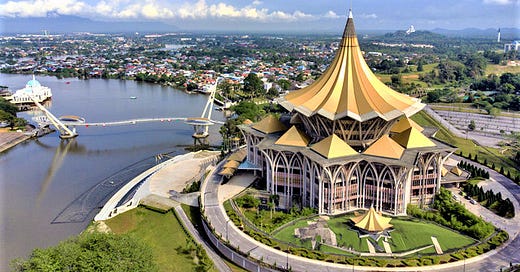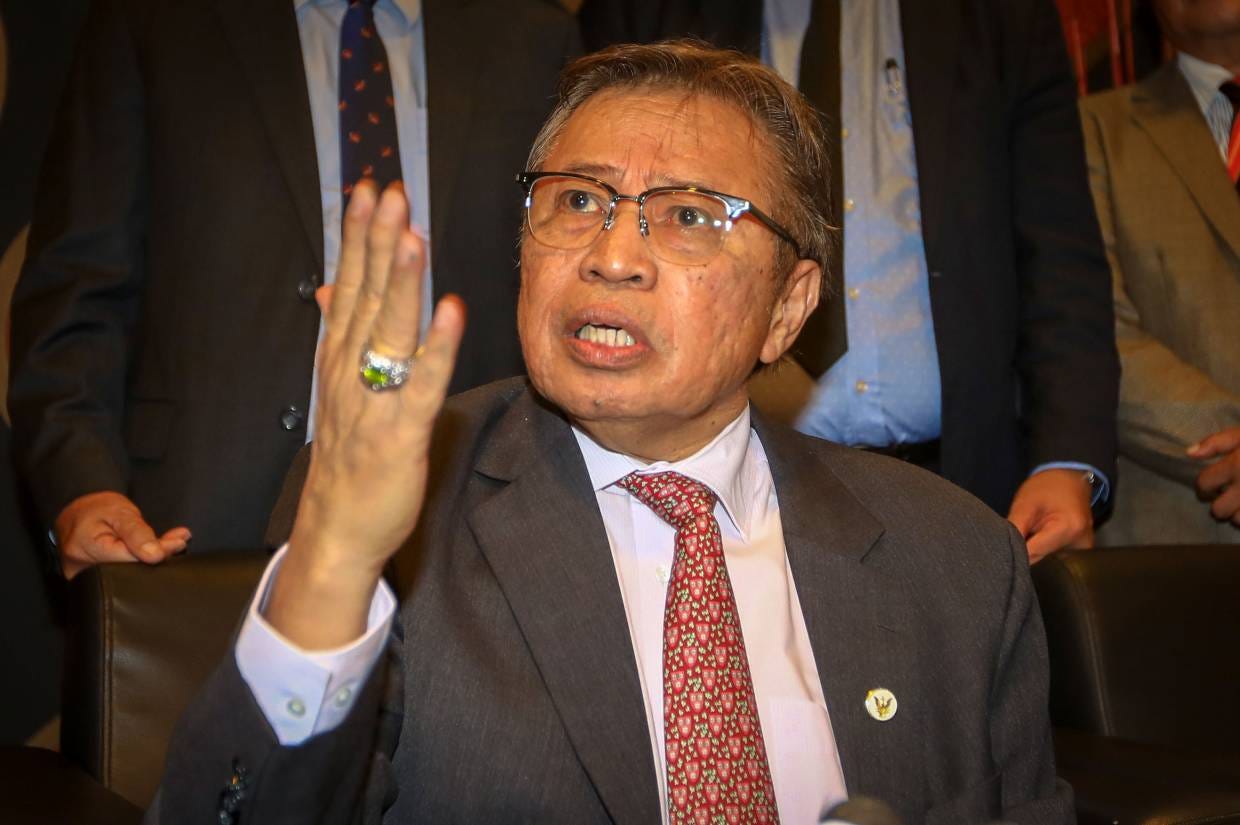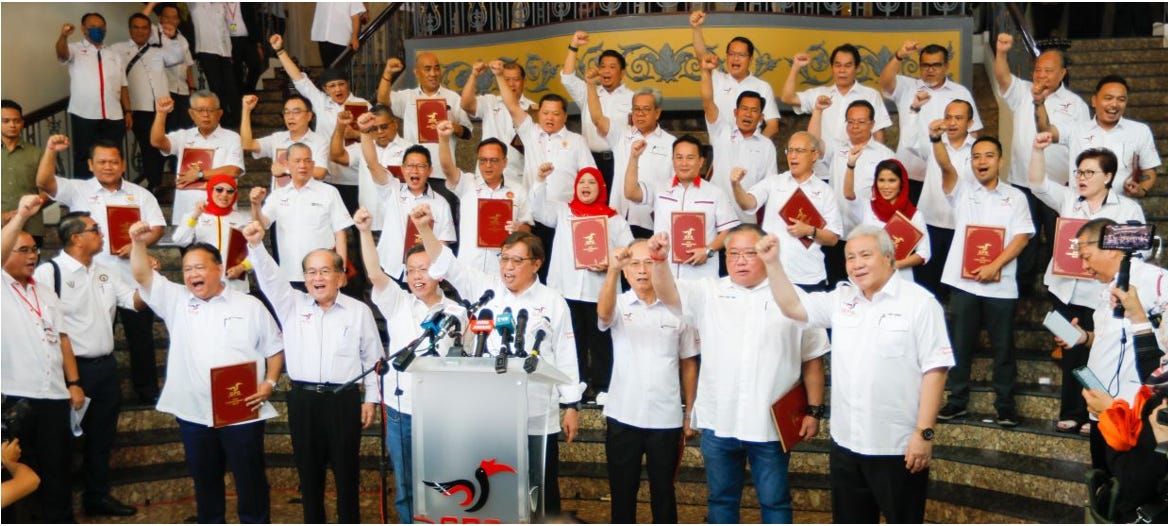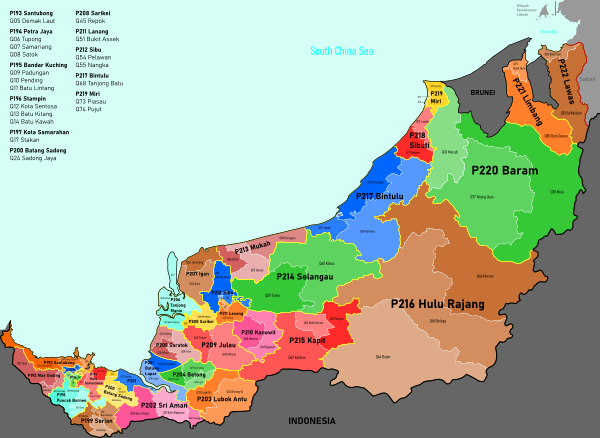Sarawak, located in Borneo is the geographically the largest state in Malaysia. Its area is almost equal to peninsula Malaysia. The population of Sarawak is 2.45 million, made up of six major ethnic groups including, Iban, Chinese, Melanu, Malay, Bidayuh, and Orang Ulu.
Last state election has defined the landscape
In the last December state elections, a coalition between the Parti Pesata Bumiputera (PBB), Parti Rakyat Sarawak (PRS), Parti Demokratik Progressif (PDP), and Parti Rakyat Bersatu Sarawak (SUPP) won a landslide victory, taking out 76 seats of the 82 seat state assembly.
Opposition Parti Sarawak Bersatu (PSB) won 4 seats, losing 2 seats, and the Democratic Action Party (DAP) won 2 seats, losing 3 seats, on the 2016 results.
GPS won 61.26 percent of the aggregate vote, while PSB won 18.69 percent, and the DAP 10.48 percent.
There are 31 federal seats up for grabs in the coming general election. PBB holds 19, DAP 6, PKR 4, and Independent one seat. There are 1,943,074 registered voters.
GE15 likely to see a similar landslide
Election issues within Sarawak will tend to be local. In the rural areas Sarawak Premier Abang Johari Openg is revered among crowds, where people will travel to see him, should he make a visit. Its very difficult to see how any other party compete against this, although the ‘children’ of longhouses communities working in the peninsula are slowly changing political attitudes.
The rural Sarawakians already have a sense of independence. This is why its very difficult for the idea of secession from Malaysia is not expanding outside professionals in urban areas. This will not be an election issue of any party campaigning on the issue, as it hasn’t got any traction out in the rural communities.
In the urban areas, GPS will most probably campaign on its successes in obtaining more state rights under the Malaysia Agreement 1963. This included a larger share of oil and gas revenue and the reinstatement of Sabah and Sarawak as equal partners in the federation.
It is yet to be seen how Pakatan candidates will campaign and frame their Sarawak manifesto. There is some perception on the ground in urban areas that Pakatan failed in government to push the case of Sarawak on issues such as oil and gas royalties.
GPS has positioned itself as the defender of Sarawak rights. How effective this is will only be known on November 19. GPS have launched a five point ‘Sarawak First’ manifesto.
· GPS has vowed to ensure the state’s political stability and strength by defending Sarawak’s rights in line with the provisions of the Malaysia Agreement 1963, the Inter-Governmental Committee report, and the state and federal constitutions.
· To expedite and enhance the development of basic infrastructure and public facilities to ease the movement of the people and drive the development process.
· To develop major roads, such as the Pan Borneo Highway, and rural and village roads connected to health, education and commercial service centres.
· To develop High quality ports and airports to drive international trade.
· To expand the coverage and quality of water and electricity supply, and provide better telecommunications and internet services.
GPS covert objectives are to ride the state of peninsula based political parties, and exercise as much autonomy as possible.
GPS is fielding 14 new candidates in this election. Five of the 31 candidates are women.
The only local party to oppose GPS is Parti Sarawak Bersatu (PSB), led by former state minister Wong Soon Koh. PSB is now the formal opposition party at state level, with more seats than Pakatan. However, PSB has been plagued with defections, and is expected only to be a spoiler on the ballot in most seats.
In the urban areas, PKR and DAP seats could be at risk from GPS. GPS’ own objective is to win 25 out of the 31 seats in the state.
In the coming election 92 candidates are contesting. GPS are contesting 31 seats, PSB 10 seats, PN 4 seats, BBM 1 seat, Parti Bumi Kenyalang (PBK) 1 seat, PKS 1 seat, and 11 independents.
This is not as intense as the peninsula, where in Sarawak there are 8 straight contests, 17 three cornered contests, 5 four cornered contests, and one 5 cornered contest.
The seats in play will be:
Mas Gading: GPS believes there were issues with their candidate last election and feel they will perform better this time round. The incumbent Mordi Bimol of the DAP won by a majority of 3,024 in 2018 and is defending his seat against Lidang Disen of GPS, and Ryan Sim Min Leong of PBK. GPS are putting a large effort into winning the two Bidayuh majority seats they don’t have.
Puncuk Borneo: another Bidayuh majority seat was won by Willie Morgan for the DAP with a 4,005 vote majority. However, he defected to the PBB after the election. GPS will want to hold this seat, but the DAP will also want to win it back. Diog Dios is running for the DAP this time.
Lubok Antu is another constituency won an independent Jugah Muyang, with a 1,059 vote majority in 2018. Muyang is defending the seat as a PN candidate, previously being a member of PKR for a short period of time. The seat is also being contested by Johnical Rayong Ngipa of PSB, Roy Angau Gingkoi of GPS, and Langga Lias of PH. GPS believe they can pick up this seat from Muyang. There is some reported member discontent over the candidacy of Muyang, who may not be able to rely upon local members to support and campaign for him. PSB are hoping to pick up this seat.
Saratok should be focused upon a number of local issues. In addition, party hopping by local members may influence the outcome. PN incumbent Ali Biji, Gierdam Jonathan Tait GPS, and Ibil Jaya of PKR will fight it out. In 2018, Ali Biji won with a 989 vote majority. Ali Biji was a deputy minister in the Ismail Sabri government, and a former vice president of PKR and faces a tough fight from Gierdam Jonathan Tait. PKR would like to win the seat back, but this will be extremely difficult.
Sarikei could be difficult for the DAP to hold with a new candidate Roderick Wong Siew Lead, taking over from Wong Ling Biu. In 2018, Wong achieved a 2,570 vote majority. This will be a straight out fight with Huang Tiong Sil of GPS.
Julau will be a rematch between the presidents of PRS Joseph Salang Gandum and Larry Sng of Parti Bangsa Malaysia, in the news over a dispute over who is the president of the party. Larry won this as an independent with a majority of 1,931 votes. Also standing is Susan George of the Parti Bangsa Dayak Sarawak (PBDS) and independent Elly Lawai Ngalai. Larry Sng will want to hold this seat, GPS also want to take the seat.
Selangau will be in play with incumbent Baru Bian moving to Lawas. Selangau will be a three cornered fight between Umpang Sampang of PH, Edwin Banta of GPS, and an independent Henry Joseph Usau. In 2018, Baru Bian narrowly won the seat with a 486 majority. GPS are looking for this seat.
Lawas will see Baru Bian, now in PSB, and incumbent Henry Sum Agong of GPS. Bian is now secretary general of PSB, and a former minister in the PH government. Sum has also been a deputy minister in the BN and PN governments.
Lanang will be interesting as it is currently held by the DAP, while the state seats within the federal seat are in the hands of GPS. Incumbent Alice Lau (DAP), will be defending her seat against Eong Ching Hong (GPS), Priscilla Lau (PSB), and independent Wong Ting Kiong,
Sibu is another seat to watch with PSB president Wong Soon Koh challenging Clarence Ting of GPS, and incumbent Oscar Ling of the DAP. Ling has an 11,422 majority, and should hold the seat.
Subscribe Below:







